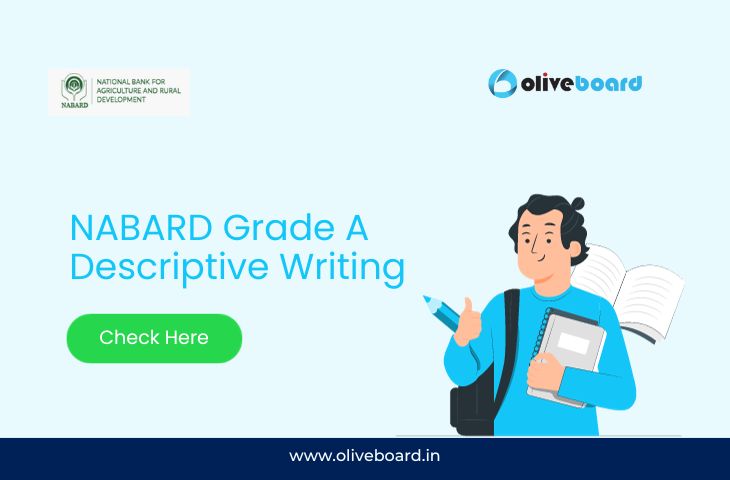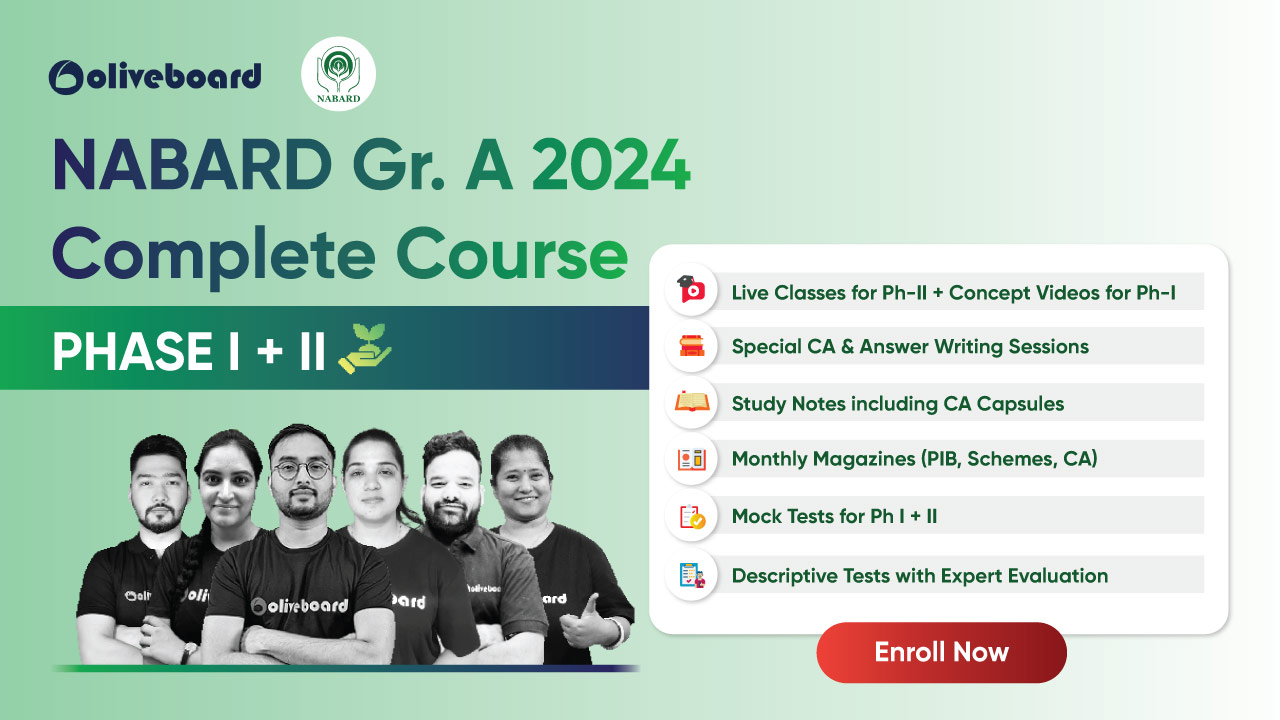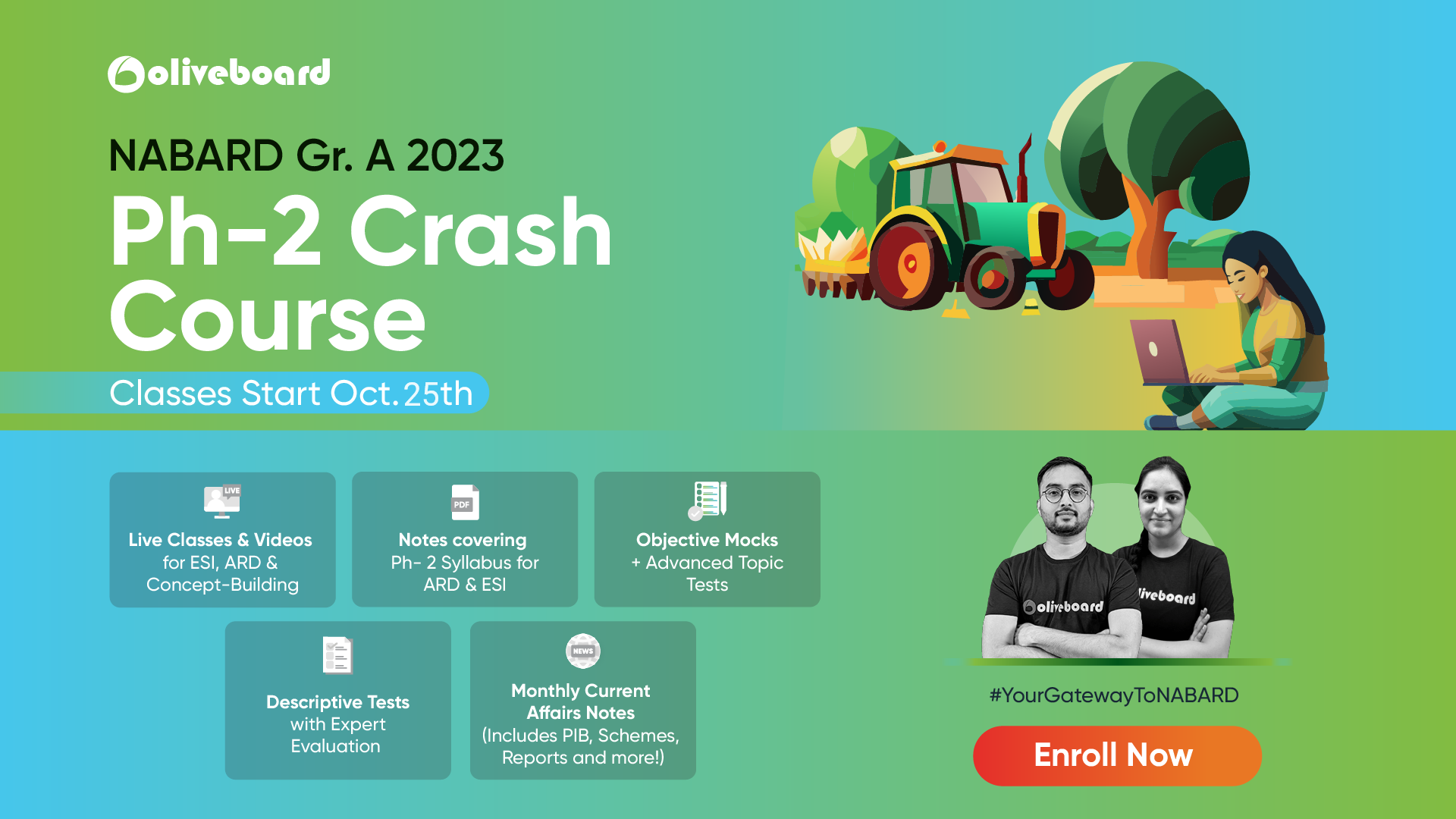NABARD Grade A Descriptive Writing
Descriptive English paper is an integral part of the NABARD Grade A phase-2 exam. It carries a total of 100 marks, the same as the maximum marks of ESI & ARD. Therefore it becomes imperative to prepare for the Descriptive English paper and try to maximize the score so that overall marks can be maximized. In the following blog, we are providing a comprehensive preparation guide for the NABARD Grade A Descriptive Writing 2023. Go through the same and share with us if this helped you in your preparation.
NABARD Grade A Descriptive Writing Preparation Guide
Check out all the subsections below for detailed NABARD Grade A Descriptive Writing Preparation Guide:
NABARD Grade A Mains Exam Pattern
You should know that NABARD Grade A Main Examination (Phase II) will be conducted online and will be a mix of MCQ and descriptive patterns.
Paper-I – General English: (Descriptive – online typing through the keyboard). The paper will have descriptive questions carrying 100 marks
Duration: 1 ½ hrs
The paper on English shall be framed in a manner to assess the writing skills including expressions and understanding of the topic. The analytical and drafting abilities of the candidate shall be assessed through the Descriptive Paper on General English comprising
1. Essay writing (40 marks)
2. Comprehension (20 marks)
3. Precis (20 Marks)
4. Report Writing/Paragraph Writing/Letter Writing (20 marks)
Mode of Exam: Online (typing through the keyboard)
Important Probable Topics: Topics related to Agriculture, Economy, and Rural Development
Evaluation Criteria: Writing skills, comprehension, understanding of the context.
NABARD Grade A Descriptive Writing – English Preparation Tips
- Candidates are required to have a basic knowledge of grammar, comprehension skills and vocabulary. These can be achieved by sparing some time every day to read newspapers, novels and magazines and brushing up on the basics of English grammar.
- The Reading comprehension passages will mostly contain passages related to these topics. This way, you’re preparing for both ‘Descriptive paper’ and ‘Economic & Social Issues’ and ‘Agriculture and Rural Development simultaneously.
- Practice typing essays, precis and letters on a daily basis.
- We also suggest you to read online articles related to Agriculture, Economy, and Rural development.
Why Online Articles?
In Phase 2 Descriptive paper, you will be required to answer by typing on the keyboard. Reading online articles and practising typing will help you get accustomed to it.
Some General Tips for English Descriptive Paper
- Spend some time every day reading newspapers, magazines, novels, etc.
- Try and read everything online to get accustomed to the exam
- Learn a few new words every day
- Go through sample precis, essays, letters, emails and memos
- Refer to the previous year’s NABARD Phase 2 General English paper to determine the kind of topics you can expect
- Practice typing essays, precis, letters, memos, and emails.
- The NABARD Grade A Notification was out on 2nd September 2023. The Phase 1 Exam was held on 16th October 2023 and the Phase 2 Exam will be held on 19th November 2023.
- To be eligible for the NABARD Grade A Exam, the candidates must be Graduates. It is important to note that any Graduate can apply.
- Those candidates who are scared of the Agricultural section that is being asked in the exam must make a note that if they prepare well for this section with complete dedication then even without any background in agriculture subject, they can excel in the exam.
NABARD Grade A Descriptive Writing 2023 – Topic Wise Preparation Tips
1. Essay
An essay is a short piece of writing on a given topic. Essays broadly comprise Introduction, Body and Conclusion. Essays should be error-free and should be properly structured and have a flow of ideas.
Introduction of Essay
Start by introducing your topic. Write briefly about the background of the topic, why it is relevant and mention your opinion about the topic, which you can later explain elaborately in the body of the essay.
Body of Essay
The body of your essay needs to be comprised of paragraphs presenting your views on the topic in detail. However, you must restrict the body to 2 to 3 paragraphs. (it’s important that you don’t get carried away while writing the body; always stay within the word limit).
In the body, include examples to support your views in addition to including statistical data, percentages, and facts. Also, the body is where you put forth your strongest argument first, followed by the second strongest, and so on. Each of your paragraphs can contain one of your main ideas, followed by sentences supporting the ideas.
Conclusion of Essay
The conclusion is a summary of your essay. Use the conclusion part to summarize and restate your main argument with the strongest evidence supporting it. Do not introduce a new idea in the conclusion and refrain from using the same words that you used in the body.
Take a few minutes to plan your essay and think about what you’re going to type instead of starting immediately. For instance, if you have 15 minutes allotted for the essay, spend the first 5 minutes planning your essay, 8 minutes writing it and use the remaining 2 minutes to revise/edit your essay.
2. Precis
Precis is a short & concise summary of a given passage. Precis contains all the important topics, mood and tone of the author and the main idea of the original passage. It’s important that you stick to the word limit in a precis. We suggest you go through sample precis and practice typing them out.
Following are steps to write a precis (in brief):
Step 1: Read the given passage and note down or highlight the most important points and keywords in the same order as presented in the original passage.
Step 2: Also note down the main idea or gist of the original passage and make note of the tone used by the author.
Step 3: Re-read the original passage and compare it with the notes you took down and cross-check if you missed any crucial information.
Step 4: Provide an appropriate topic to your precis.
Step 5: Finally, draft your precis based on the notes you took down.
3. Comprehension
Reading comprehension tests your reading speed, comprehension skills and ability to understand the meaning of words and sentences through context.
To master reading comprehension:
- You need to have a good reading speed
- Master your vocabulary by learning new words every day
- Read up on idioms and phrases and understand their meaning. Use them in your daily conversation
- Read newspapers, editorials, etc. on topics like Agriculture, Rural Development and the Economy
4. Business/ Office Correspondence
Writing for Business/Officer correspondence refers to writing memos, emails & letters. There are several differences in the way memos, letters and emails are written in terms of format, tone, purpose and length. Before writing memos, emails & letters, you need to determine the purpose of writing and to who you’re writing.
a. Memos
Memos should contain a subject line, introduction, discussion & conclusion. Your subject line needs to be catchy as 100% of the readers will read your memo. Your introduction should contain the purpose of writing the memo and what you’re expecting.
The discussion should contain the reporter’s questions like what, who, why, how and when. Your conclusion needs to be complimentary as well as include details of the action you want the readers to take. Memos can be written in an informal friendly tone and in simple language.
b. Emails
Few things to keep in mind when writing an email:
- Know your audience
- Identify yourself
- Use the right email ids
- Write a simple and catchy subject line
- Keep your message structured and brief
- Use highlighting where necessary
- Proofread before sending your email
c. Letters
There are various kinds of letters: News, complaints, sales, adjustments, inquiries and covers. Following are a few essential components that letters should contain:
- Address of the writer
- Date
- Address of the recipient
- Salutation
- Body of the letter
- Complimentary conclusion
- Signed and typed name
However, there are some components that are optional depending on the type of letter you’re drafting:
- Subject line
- Enclosure/new page notations
- Initials of the writer
- Copy notation
Ebooks Specifically for NABARD Grade A Exam 2023: Download for FREE
- Free Ebook on Top 40 ARD Questions for NABARD Grade A – Part 1
- Download Top 40 ARD Questions for NABARD Grade A – Part 2 FREE Ebook
- Download Top 40 ARD Questions FREE Ebook for NABARD Grade A – Part 3
- Agriculture Basics for NABARD Grade A 2023: Download FREE Ebook
- Agriculture Markets for NABARD Grade A 2023: Download FREE Ebook
- Types of Soil for NABARD Grade A 2023: Download FREE Ebook
- Irrigation Management, Types & Sources for NABARD Grade A 2023
- Water Resource Management for NABARD Grade A 2023
- Nature of Indian Economy for NABARD Grade A 2023
Download FREE Ebooks on Government Schemes for all Regulatory Exams: IRDAI, RBI, NABARD, SIDBI, SEBI, IFSCA
- Final Revision of Important Govt Schemes for RBI Grade B – Download FREE Ebook
- FREE Ebook on Top 10 Govt Schemes from Ministry of Agriculture: Part 1 – Download
- FREE Ebook on Top 10 Govt Schemes from Ministry of Agriculture: Part 2 – Download
- Download Top 5 Government Schemes From the Ministry of Education
- Download the Free Ebook on Top 6 Govt. Schemes from the Ministry of Finance
- Ebook on Top 5 Initiatives of NITI Aayog – Download FREE
FREE Ebooks on General Awareness, ESI, FM & Miscellaneous Topics for all Regulatory Exams: IRDAI, RBI, NABARD, SIDBI, SEBI, IFSCA – Download
The syllabus of all the regulatory exams is somewhat similar, so practicing and learning from other exam-specific ebooks are also beneficial in the preparation. Here, we have compiled all the latest ebooks that will help you ace the exam.
- Download RBI Grade B 2023 GA Answer Key Ebook
- Get RBI Grade B 2023 ESI & FM Objective Questions Answer Key Ebook
- Download RBI Grade B 2023 ESI & FM Descriptive Questions Answer Key Ebook
- Free Ebook on Top 40 ARD Questions for NABARD Grade A – Part 1
- Download Top 40 ARD Questions for NABARD Grade A – Part 2 FREE Ebook
- Download Top 40 ARD Questions FREE Ebook for NABARD Grade A – Part 3
- Get a FREE Ebook on Key Highlights from the Economic Survey 2022-23
- Download RBI Annual Report 2023 Important MCQs: Part 1 FREE Ebook
- Download RBI Annual Report 2023 Important MCQs: Part 2 FREE Ebook
- Top 50 Banking & Finance CA for all Regulatory Exams (March-April 2023)
- RBI Bolt March 2023 Summary FREE Ebook
- Top 100 PIB Current Affairs MCQs for RBI Grade B 2023: Part 1 – Download FREE
- Top 100 PIB Current Affairs MCQs for RBI Grade B 2023: Part 2 – Download FREE
- FREE Ebook on Introduction to Management
- FREE Ebook on Indian Agriculture
- Insurance Sector in India FREE Ebook
- International Economic Institutions FREE Ebook
Download FREE Ebooks on QRE (Quantitative Aptitude, Reasoning, English) for all Regulatory Exams: IRDAI, RBI, NABARD, SIDBI, SEBI, IFSCA
Download all the ebooks for FREE and enhance your preparation.
Quantitative Aptitude Ebooks
- Download the Free Ebook on Top 50 Quants Questions for IRDAI Assistant Manager
- Top 25 Number Series Questions for RBI Grade B 2023 – Download FREE
- Most Repetitive Quants Questions for RBI Grade B 2023 – Download FREE Ebook
Reasoning Ebooks
- Download the Free Ebook on Top 50 Reasoning Questions for IRDAI Assistant Manager
- Most Repetitive Reasoning Questions for RBI Grade B 2023 – Download FREE Ebook
- Top 25 Puzzle Questions for RBI Grade B 2023: Download FREE
- Top 25 Syllogism Questions for RBI Grade B 2023: Download FREE
English Language Ebooks
- Download the Free Ebook on Top 50 English Questions for IRDAI Assistant Manager
- Most Repetitive English Questions for RBI Grade B 2023 – Download FREE Ebook
- FREE Ebook on Top 25 Subject Verb Agreement Questions for RBI Grade B 2023: Download
- Ebook on Top 20 Para Jumble Questions for RBI Grade B 2023: Download FREE
- Top 100 Idioms & Phrases for RBI Grade B 2023: Download FREE Ebook
- Top 135 One-Word Substitutions for RBI Grade B 2023: Download
Preparing for Regulatory Exams? Need regular updates of CA, Notifications, Free Ebooks, YT Sessions, and More, then Join Our Regulatory Whatsapp Channel.
If you are preparing for Regulatory Exams, then do not forget to check out all the blogs on the regulatory exams. Check Regulatory Exam Blogs.
Get Daily FREE Material for RBI Grade B, NABARD Grade A, SEBI Grade A, IFSCA Grade A, and SIDBI Grade A, IRDAI Assistant Manager – Join Oliveboard’s Regulatory Exam Telegram Channel
Attempt Engaging Quiz on YTC and get complete study material and classes for RBI Grade B, NABARD Grade A, SEBI Grade A, IFSCA Grade A, and SIDBI Grade A, IRDAI Assistant Manager- Subscribe to Oliveboard’s Regulatory Exam Youtube Channel
| Related Links | Related Links |
| RBI Grade B Notification | IRDAI Assistant Manager Notification |
| SEBI Grade A Notification | IFSCA Grade A Notification |
DOWNLOAD THE RBI, NABARD, SEBI Prep App FOR ON-THE-GO EXAM PREPARATION
The app provides comprehensive study material in the form of online courses to ace these examinations. The study material ranges from online LIVE classes, video lectures, study notes, revision sessions, past year papers, topic tests, the objective plus descriptive mock tests, mock interviews, and much more.

- RBI Grade B DSIM Notification 2024, Eligibility, Exam Date
- SSC Selection Post Phase 12 Syllabus 2024 And Exam Pattern
- RBI Grade B Online Coaching 2024, All RBI Grade B Courses
- SSC Selection Post Phase 12 Selection Process, Exam Pattern
- SSC Selection Post Phase 12 Admit Card 2024, Download PDF

Hello there! I’m a dedicated Government Job aspirant turned passionate writer & content marketer. My blogs are a one-stop destination for accurate and comprehensive information on exams like Regulatory Bodies, Banking, SSC, State PSCs, and more. I’m on a mission to provide you with all the details you need, conveniently in one place. When I’m not writing and marketing, you’ll find me happily experimenting in the kitchen, cooking up delightful treats. Join me on this journey of knowledge and flavors!
Oliveboard Live Courses & Mock Test Series




